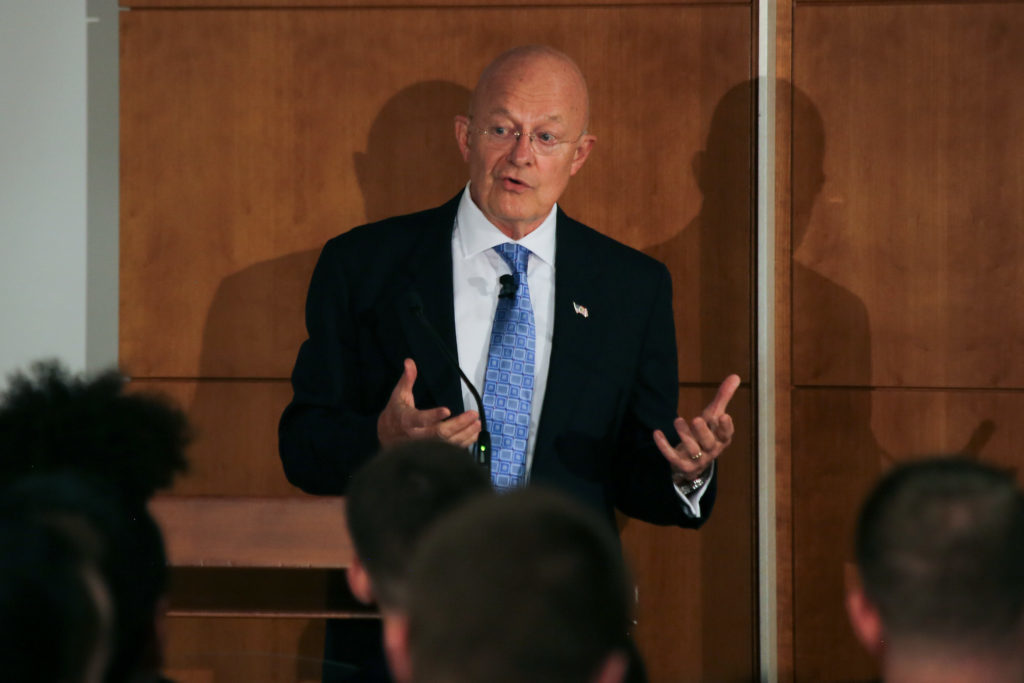James Clapper, the former director of National Intelligence, reflected on the lessons learned during his more than 50 years of service in the U.S. intelligence community and offered his thoughts on North Korea and the Russia investigation in an address to students at the Elliott School of International Affairs Tuesday.
He said the intelligence profession values intellect rather than social characteristics, and that the career focuses more on inferences, hypotheses and theories.
“That’s one of the great things about intelligence – it’s all about your brain,” Clapper said. “It doesn’t matter what your ethnic group is, your gender, your sexual preference.”
He said the intelligence community reduces risk and uncertainty for policymakers making important decisions and helps to address the challenges the country faces today.
Here are three key things Klapper discussed:
1. Government in North Korea
Clapper highlighted the “paranoia” and “siege mentality” of the North Korean government. He said, based on his experiences as a director of military intelligence in North Korea, that American agents face challenges collecting information about the regime and interpreting its threats against the United States and others.
Clapper said establishing a diplomatic presence in North Korea will help the U.S. engage with an unfamiliar government, but that combative rhetoric from President Donald Trump’s administration, especially over Twitter, fulfills the validation and attention North Korea craves from the U.S.
In recent weeks Trump and North Korean leader Kim Jong Un have exchanged personal insults and threats of war in speeches, statements and tweets.
“Kim Jong Un is just eating this up, having a direct dialogue with the president of the United States,” Clapper said.
He added that North Korea’s only bargaining chip and means of self-security is nuclear weapons.
“The notion of demanding denuclearization as a condition for negotiation is crazy,” Clapper said.
2. Russia and the 2016 presidential election
Clapper said the effort by Russian operatives to sow discord and discontent in last year’s election was successful and that the U.S. is unprepared to stop this from happening again in the future.
“The use of social media as a part of the Russian campaign to interfere with our election was wildly successful with a modest investment of resources,” he said.
He said Russian interference was a serious threat to American democracy and one that is not going away. Clapper was highly-critical of the Trump administration’s reaction to the issue of Russian interference after many officials doubted intelligence community findings that the Russian government acted to help Trump win the election.
“This is what the American public needs to be concerned about, because this is going to continue and the Russians don’t care,” Clapper said. “Next time they’ll stick it to the Republicans. We as a people need to be alert for that.”
3. Technology Privacy
Clapper said, in terms of privacy issues in the intelligence community, that it is the private sector’s responsibility to cooperate with the government.
“The aftermath of the Snowden revelations was a chilling of the historical partnership between industry and the intelligence community,” Clapper said.
Edward Snowden released a large amount of classified information on the U.S. government’s information-collecting operation on both private companies and citizens in 2013.
He added that companies must work with the government to ensure national security and that the past partnership with the private sector must be restored through increased declassification of intelligence documents.
“Now, when you do that, transparency has a double-edged sword, because our adversaries go to school on that,” Clapper said. “I think we’re out of balance right now.”





